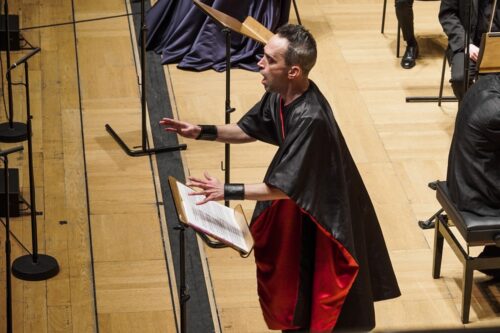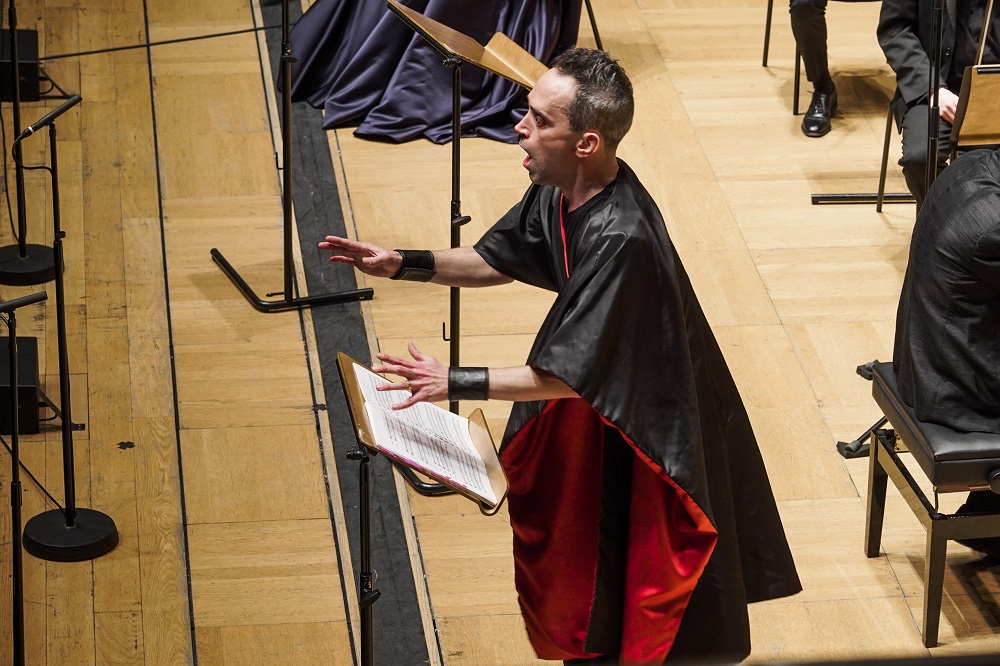 United Kingdom Handel, Demons in the Bath: Aci, Galatea e Polifemo: Zoë Brookshaw (soprano, Aci); Bethany Horak-Hallett (mezzo-soprano, Galatea); Trevor Bowes (bass, Polifemo); Orchestra of the Age of Enlightenment / Steven Devine (director, harpsichord). Cadogan Hall, London, 23.1.2022. (CC)
United Kingdom Handel, Demons in the Bath: Aci, Galatea e Polifemo: Zoë Brookshaw (soprano, Aci); Bethany Horak-Hallett (mezzo-soprano, Galatea); Trevor Bowes (bass, Polifemo); Orchestra of the Age of Enlightenment / Steven Devine (director, harpsichord). Cadogan Hall, London, 23.1.2022. (CC)

Handel – Concerto grosso, Op.6/10 (HWV 328): Overture; Aci, Galatea e Polifemo, HWV 72 (1708)
Transferred over form the original venue of the Southbank Centre’s Queen Elizabeth Hall, surely this performance has to be one of the events of the year (and it is only January!). My last experience of this version of Handel’s version of the Acis and Galatea story was a fully staged performance streamed from Piacenza in lockdown (review; the performance is still available, although now on YouTube).
Written in Italy and contemporaneous with the Dixit Dominus, Aci was a commission by the poet and patron the Duchess Aurora Sanseverino for a wedding celebration (of a noble) in Naples. The libretto is by her private secretary, Nicola Giuvo. The story of this evening-length dramatic serenata Is pretty simple: the central focus is the love between the shepherd Aci and the nymph Galatea; the problem is the jealous cyclops (demon) Polifemo. Aci is crushed to death by a boulder flung by Polifemo; Galatea touchingly turns Aci’s blood into sparkling water as it trickles out. The work ends with a sprightly, trumpet-garnished ‘moral’: ‘Chi ben ama hà per oggetti | Fido amore pura costanza | Che se mancano I dilletti poi non manca la speranza’ (Who loves well has the goals of faithful love, pure steadfastness. Even if pleasures are lacking, at least there is hope’).
We should not confuse this, as that previous review pointed out, with Handel’s more famous Acis and Galatea, HWV 49 (of ‘O ruddier than the cherry’ fame), written in England a decade later but pretty much a completely new score. And it is notable – and telling in terms of the strength of the score of HWV 72 – that Handel, the great recycler, re-used many of the melodies from Aci in many later works.
This score contains one of the most demanding bass parts in the entire repertoire: that of Polifemo. Those demands are most obvious in the aria that opens what was here the post-interval part two (ideally there’s no interval) – but the part bristles with difficulties pretty much throughout. The range required of the singer is some two and a half octaves. As regards the other two roles, they are sung by two females: Aci was written for a soprano and Galatea for a mezzo-soprano (so possibly the male singer was a castrato and Galatea was sung by a woman).
A pre-concert discussion was fascinating, with Trevor Bowes talking about how he has spent a significant chunk of time preparing his voice for this part, plus fascinating contributions from Orchestra of the Age of Enlightenment oboist Katharina Spreckelsen, leader Huw Daniel and the director, Steven Devine. The discussion of different versions and sources was fascinating (including reference to a hybrid English/Italian score in the British Library) and what to do in the absence of an Overture. Devine has experimented with various alternatives: tonight’s was the D minor Overture to the Concerto grosso, Op.6/10, its minor-mode forthrightness perfect to set the scene, especially with double-dotting as crisp as the OAE’s, and with such pinpoint articulation in the fugal opening of the Allegro.
It is worth noting the brilliance of Devine’s continuo group throughout: he had pointed out in the pre-concert talk how Handel’s continuo work is very different form Mozart’s, often beginning sections on a dissonance. Devine and his continuo colleagues seemed hyper-attuned to this throughout – never were they a mere interlude between arias. A special mention for William Carter’s superb theorbo contributions is also in order.
The scoring used by Handel is consistently illuminating, nowhere more so perhaps than in Galatea’s aria ‘S’agita in mezzo all’onde’ (‘Among the waves’), Rachel Beckett’s recorder a real delight against violins both arco and, later, pizzicato; or perhaps one can also point to the stripped-down scoring of voice and cellos only in Galatea’s ‘Se m’ami o caro’ (‘If you love me’).
Handel’s score unfolds with a delicious sense of inevitability and rightness. Galatea’s early aria, ‘Sforzano la piangere’ (‘The stars that smiled upon your suffering’) was superbly sung by Bethany Horak-Hallett (last seen in VOCES8’s fabulous performance of Messiah). There was no sense of warming up, whereas the soprano Aci, Zoë Brookshaw, took a few minutes to settle in the opening Duetto. Once she had settled, though, Brookshaw and Horak-Hallett made a powerful combination, their voices nicely complementary, the warmth of Horak-Hallett nicely set against the pure freshness of Brookshaw. Horak-Hallett has a particularly appealing way of shaping decorations in the A1 sections of arias, too, but it was her dramatic resonance with the part that impressed the most: one thinks of the feistiness of delivery of her single-line question, ‘Ma dimmi il come?’ (‘But tell me the “how”’).
This particular Aci’s triumphs came later in the evening. There is a lovely purity to Brookshaw’s voice, something we heard to perfection in her recitative ‘Purché l’amato bene’ (‘Provided that my beloved would not yield’), and the succeeding aria ‘Qui l’augel’ with a solo, dialoguing parts for solo violin (Huw Daniels) and oboe (Katharina Spreckelsen). This is the so-called bird aria (the text means ‘Here the bird from tree to tree happily flies’). And how well Brookshaw and Horak-Hallett worked together in their later dialogue with Polifemo.

But the true star of the evening was Trevor Bowes: his rendition of Polifemo’s opening aria, ‘Sibilar l’angui d’Aletto’ (‘The hissing of Ancho’s snakes’) was a triumph, enabled by the brilliant, thrilling trumpets of David Blackadder and Philip Bainbridge. Bowes’s achievement was not just technical: one really felt for him as he meditated on the cruelty meted out to him in ‘Non sempre, no, crudele’ (‘Not forever, no, cruel one’), a true lament and, in purely musical terms, almost as impressive as anything in this extraordinary evening. Almost. That aria for bass (‘Fra l’ombre’/ ‘Among the shadows’) was the technical and emotive tour de force of the performance though. Handel begins in the chthonic depths of the instrumental group, over which the bass offers a drooping, arpeggiated opening phrase. Yes, there are huge leaps in this aria, but Bowes presented them so musically, so tenderly, that one was completely enraptured by the unfolding experience. Bowes’s sense of phrasing was what gave the music its sense of perfection. One of the most interior and profound of all arias for bass Bowes offered us a complete musical triumph, the precipitous leaps
It was good to have the libretto printed complete with translation in the booklet (currently available in digital format here), and to have a pre-concert event that was so valuable in enhancing one’s enjoyment of the evening. What a triumph the whole evening was!
Colin Clarke
